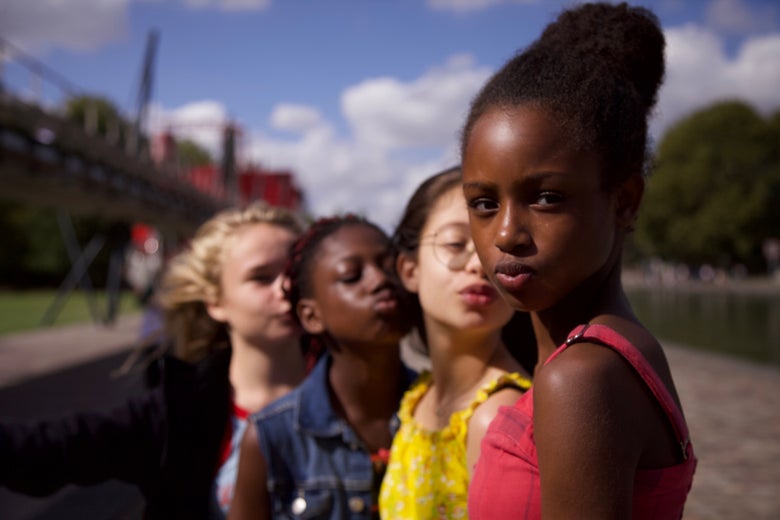
Sparked by a promotional image featuring the movie’s tween stars in revealing clothing and suggestive poses, the controversy around Netflix’s Cuties has only grown as the film has finally arrived on the streaming service. Maïmouna Doucouré’s first feature is, according to an interview with the French Senegalese filmmaker posted by Netflix this week, a “deeply feminist film with an activist message.”* It debuted at the Sundance Film Festival, where it won the award for direction in the World Cinema section. But weeks after a petition charging it with being produced “for the viewing pleasure of pedophiles” garnered hundreds of thousands of signatures, the movie finds itself at the toxic intersection of QAnon delusion and right-wing moral panic, with a smattering of leftist outrage on the side. Brietbart has posted about the movie a half-dozen times in the past two days, singling out critics who praised the film, several of whom have received death threats and been harassed off social media. And Thursday night, Tucker Carlson made it a centerpiece of his show, accusing a nonspecific “they” behind the movie of wanting to “destroy young girls.”
Considering how few of Cuties’ attackers have actually seen the film, countering their criticisms with facts feels a little like bringing a knife to a gunfight. Those labeling it child pornography seem to have adopted a modified version of Supreme Court Justice Potter Stewart’s adage: They know it when they don’t see it. By definition, pornography requires intent, and whether or not Doucouré succeeded (and the reviews are divided on this point), her intent is clear. The movie’s protagonist, Amy, is an 11-year-old bouncing between the repressive culture of her conservative Islamic upbringing, where she is warned that “evil shows itself in the scantily clad women,” and the hypersexualized environment of Western culture, where images of adult women doing strip-club gyrations are emulated by tweens on social media for likes. The movie presents those images in order to critique them, in a way that could not possibly be more clear: When Amy and the titular dance troupe she’s formed with three schoolmates finally perform in front of an audience, Doucouré repeatedly cuts away to the disgusted adults watching them, some booing, some covering their children’s eyes.
Instead of the Potter Stewart test, Breitbart’s John Nolte presents what might be called the Floyd Test. The initial marketing campaign, he writes, was “aimed directly at the naked-guys-in-a-raincoat-named Floyd crowd,” and as for the movie itself: “Naked Floyd’s gonna love it.” The point isn’t the filmmaker’s intent—although he later gets around to dismissing that as “bullshit,” too—it’s that Cuties might turn perverts on. That may be true, but it’s also true of countless more innocent images, and the diligence with which Nolte jotted down every purported crotch shot, at least until he “lost count after five,” speaks to its own kind of not-entirely-uncreepy obsession.
It’s hardly accidental that most if not all of the right-wing attacks on Cuties invoke Netflix’s connection to Barack Obama, although the Obamas, who do have a production deal with Netflix, had nothing to do with the film’s acquisition. It’s a way of winking at QAnon’s insistence that the Democratic Party is a haven for pedophiles, and it ties in neatly with the terror of Black and especially African sexuality that lurks just beneath the moral panic around Cuties. So much of the furor has centered on the sight of the girls in Amy’s mixed-race dance group twerking, emulating a style of dance linked to the African diaspora and then picked up by white artists like Miley Cyrus. In the Netflix poster that started all this, it’s the white girl in Amy’s troupe who seems most confident and defiant, while she looks at the camera with sideways, uncertain eyes.
There is much in Cuties that’s alarming, and is meant to be. That may or may not excuse it, but it at least has to be taken into account. Doucouré has said that she spent a year and a half interviewing more than a hundred preteen girls as research for the script, and much of her story comes directly out of what she learned about their relationship to their own sexuality, especially as it’s filtered and enhanced through social media. (Amy’s phone travels through the movie like a talisman, or a weapon that’s as likely to injure its wielder as its target.) “Today, the sexier and the more objectified a woman is, the more value she has in the eyes of social media,” Doucouré told the French publication Cineuropa. “And when you’re 11, you don’t really understand all these mechanisms, but you tend to mimic, to do the same thing as others in order to get a similar result. I think it is urgent that we talk about it, that a debate be had on the subject.” What the director is getting instead is a very 2020 fraud.
Correction, Sept. 11, 2020: This post originally misspelled Maïmouna Doucouré’s last name.
"movie" - Google News
September 12, 2020 at 05:05AM
https://ift.tt/2ZtIbit
Netflix Cuties controversy explained: Why conservatives are obsessed with the movie. - Slate
"movie" - Google News
https://ift.tt/35pMQUg
https://ift.tt/3fb7bBl
Bagikan Berita Ini














0 Response to "Netflix Cuties controversy explained: Why conservatives are obsessed with the movie. - Slate"
Post a Comment